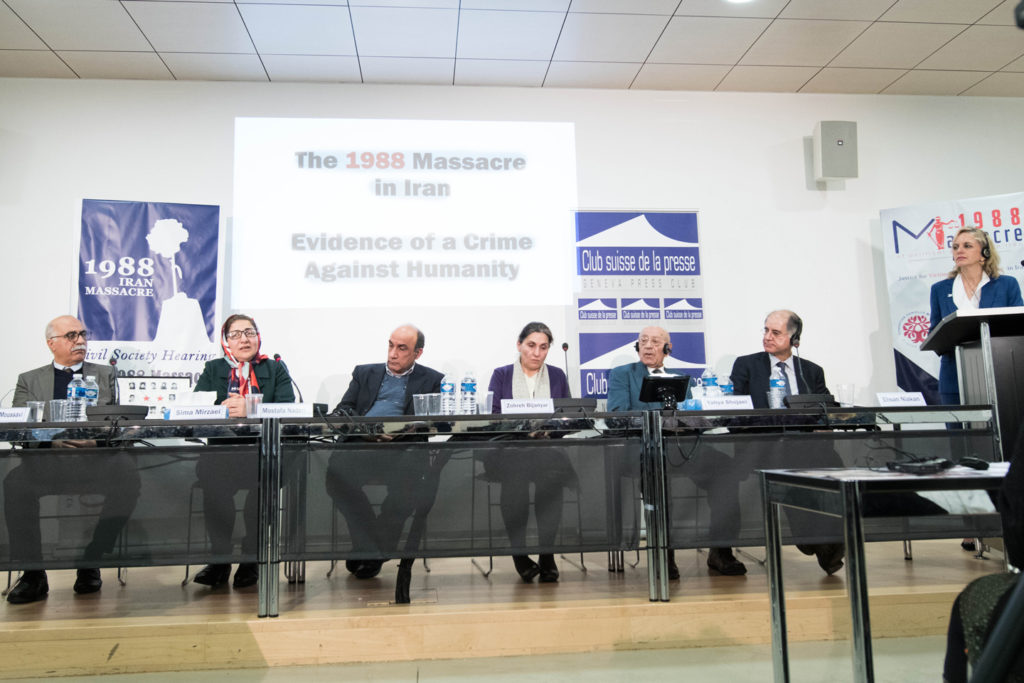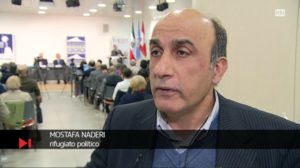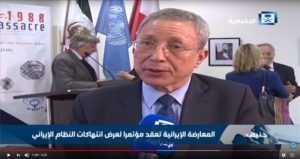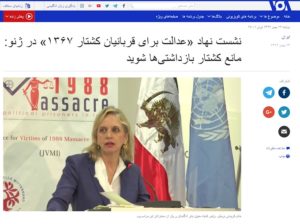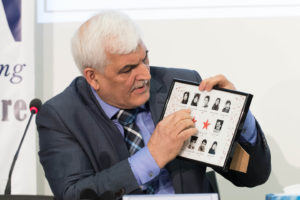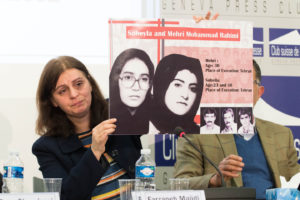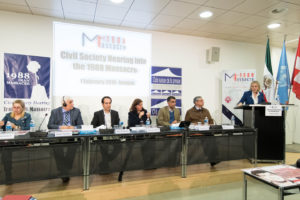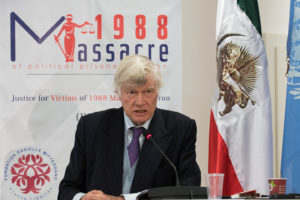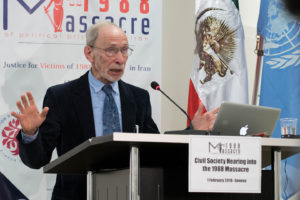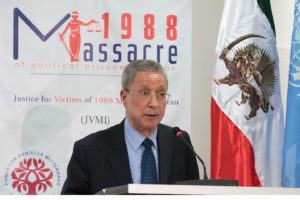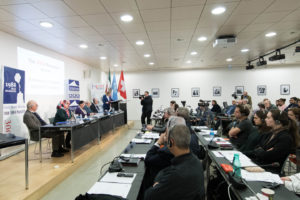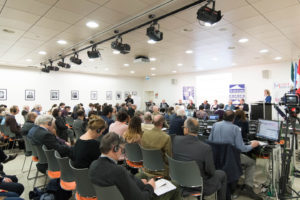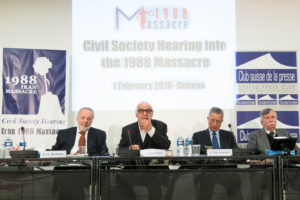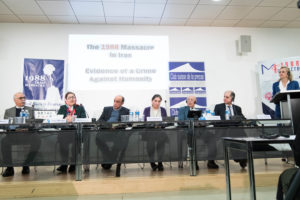On 1 February 2018, a civil society hearing in Geneva heard witnesses and legal experts and offered an adjudication of the 1988 massacre of political prisoners in Iran. The hearing was the first of its kind by NGOs in Geneva, and it urged immediate action by the United Nations to address the current wave of mass arrests and killings in Iranian jails following the recent anti-government protests.
International civil society and NGOs urged the UN High Commissioner for Human Rights to establish a fact-finding mission to investigate the months-long massacre during which the Islamic Republic of Iran executed an estimated 30,000 political prisoners, mostly activists of the People’s Mojahedin Organization of Iran (PMOI/MEK).
During the Geneva hearing, former UN Judges, senior human rights officials and human rights experts and advocates stressed that such an inquiry, long overdue, is now especially crucial in light of the arrest of thousands of peaceful anti-government protesters at the turn of the year, after which numerous protesters died while in authorities’ custody.
Beginning on December 28, two weeks of nationwide protests sent shock waves through the Iranian regime. Thousands of Iranians have been arrested and upwards of 50 killed, at least 12 of them under torture. Many more are at risk of a similar fate.
Participants in the hearing expressed consensus that the 1988 massacre clearly constitutes a crime against humanity. They stressed that the international community and in particular the UN are obliged to take all necessary measures to end impunity in this case and they warned that failure to hold Tehran accountable has simply emboldened the ruling theocracy to continue its gross human rights violations. According to the indictment presented at the hearing, many of the leading perpetrators of the 1988 massacre remain alive today and even continue to hold positions of prominence in Iranian politics and law.
The indictment was presented by the distinguished British lawyer, Kirsty Brimelow QC. She presented ample evidence establishing that the 1988 massacre constitutes a crime against humanity and referring to the current situation in Iran, particularly, the recent mass arrest and killing of protestors in custody, concluded that the crime against humanity in Iran perpetrated by the same officials continues today.
The day-long event was organized by Justice for Victims of the 1988 Massacre in Iran (JVMI). It was sponsored by four NGOs with Consultative Status at the UN.
The hearing was broken down into four sessions:
The first presented an indictment related to the 1988 massacre. Kirsty Brimelow QC, Chair of the Bar Human Rights Committee of the Bar of England and Wales, made the presentation.
The second session heard opinions from preeminent international human rights experts:
Prof Jean Ziegler, vice president of the Advisory Committee to the United Nations Human Rights Council, said it is high time for the UN to end the impunity for the perpetrators of the 1988 massacre.
Dr Juan Garcés, Chief Lawyer in the Spanish case against General Pinochet, explained that under international law these crimes must be investigated.
Tahar Boumedra, a former UN official on human rights, who has written two books on the 1988 massacre provided a full picture of the 1988 massacre and the failure of the UN to take appropriate action. He called on the UN High Commissioner for Human Rights to set up a fact-finding mission to investigate the crime.
Eric Sottas, former Secretary-General of the World Organization Against Torture (OMCT), also spoke about the need for the international community to investigate the crimes committed in 1988 in Iran.
The third session heard oral testimony from survivors and eye-witnesses to the massacre. Mostafa Naderi, who was incarcerated from 1981 to 1992 for being a supporter of the PMOI and miraculously survived the 1988 massacre recounted the 11 years he spent in prison, including five in solitary confinement.
The presiding panel of adjudicators included Geoffrey Robertson QC, head of Doughty Street Chambers in the UK and former appeal judge at the UN Special Court for Sierra Leone, and Prof Eric David, Professor emeritus of international law at the Université libre de Bruxelles. The adjudicators of the civil society hearing presented their concluding remarks at the final session of the day. Both of them, based on the evidence provided, concluded that the UN has an obligation to investigate the 1988 massacre in Iran.
Media coverage:
The civil society hearing was widely covered by the international press including Swiss public broadcaster RSI, Tribune de Genève, Saudi news channel Al-Ekhbariya, Newsweek, Radio Farda, Voice of America (Persian Service), The Hill (U.S.), AFP Photo and Getty Images. Below are highlights of some of the coverage:
RSI (Radiotelevisione svizzera di lingua italiana), Switzerland’s Italian-language television channel, 2 February 2018, “30th anniversary of the massacre of political prisoners”
Tribune de Genève, 1 February 2018, “L’ONU doit agir maintenant pour mettre fin à l’impunité en Iran”
Al-Ekhbariya TV (Saudi News Channel), 1 February 2018, “Iranian opponents hold a conference to expose human rights violations by the Iranian regime”
Newsweek, 30 January 2018, “THE U.N. MUST INVESTIGATE IRAN’S 1988 MASSACRE, OR DETAINED PROTESTERS TODAY FACE SAME FATE”
Radio Farda, 1 February 2018, “Mock trial held to investigate executions of the 1980s in Iran”
VOA Persian, 1 February 2018, “Meeting by ‘Justice for the Victims of the 1988 Massacre’ in Geneva: Prevent a massacre of detainees”
The Hill, 31 January 2018, “Iran’s latest crackdown on dissent is fueled by UN silence over past crimes”
AFP Photo, 1 February 2018, “Iran-Massacre”:
Getty Images, 1 February 2018, “Civil society hearing into the 1988 massacre in Iran”:
Background:
Asma Jahangir, the Special Rapporteur on the situation of human rights in the Islamic Republic of Iran stated in a report on 14 August 2017, “Between July and August 1988, thousands of political prisoners, men, women and teen-agers, were reportedly executed pursuant to a fatwa issued by the then Supreme Leader, Ayatollah Khomeini. A three-man commission was reportedly created with a view to determining who should be executed. The bodies of the victims were reportedly buried in unmarked graves and their families never informed of their whereabouts. These events, known as the 1988 massacres, have never been officially acknowledged. In January 1989, the Special Representative of the Commission on Human Rights on the situation of human rights in the Islamic Republic of Iran, Reynaldo Galindo Pohl, expressed concern over the ‘global denial’ of the executions and called on Iranian authorities to conduct an investigation. Such an investigation has yet to be undertaken.”
A report by UN Secretary General António Guterres to the General Assembly about the “Situation of human rights in the Islamic Republic of Iran”, dated 31 October 2017, stated: “The Office of the United Nations High Commissioner for Human Rights (OHCHR) continued to receive a large number of complaints from families of the victims of executions which took place in 1988. In a joint statement issued in March, 20 human rights organizations called on the authorities to stop the harassment, intimidation and prosecution of human rights defenders seeking truth and justice on behalf of individuals who were summarily executed or forcibly disappeared during the 1980s and of their families.”
(Credit: Orbisswiss Photos Geneva)

